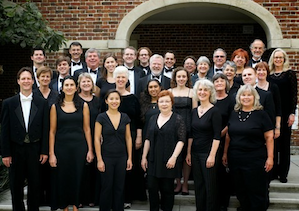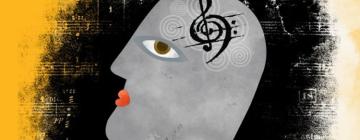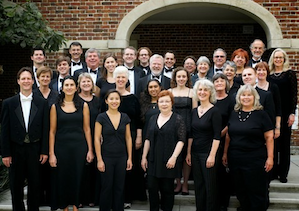
In recent years, the California Bach Society has become a prospector of Baroque gold. Its concerts have brought forth exquisite, rarely heard works by forgotten masters from the lost frontier, to the delight of its audiences. With its most recent program, “Die Familie Bach,” the CBS choir, led by guest conductor Magen Solomon, returned to its roots for an unusual take on the all-Bach program. Its Friday night performance at St. Mark’s Lutheran Church in San Francisco delighted the audience while at the same time inviting it to hear the familiar from a fresh perspective.
Johann Sebastian Bach is susceptible to typecasting on concert programs. His music so often serves as the first stop on a chronological Grand Tour through classical music or as the end-of-line of the Baroque that we risk becoming complacent in the way we perceive the most famous Bach. The CBS program, however, cast him neither as the Old Testament of music nor as the culmination of early music — not even as the canonized saint that he has become. He was, simply, one of the family. This program featured music entirely by Johann Sebastian and his Bach relatives. We could call it an All-Bachs concert.
The Bach musical dynasty spanned more than two centuries and included over 75 musicians. Four generations of Bachs were represented on the concert, which featured a thoughtful selection of sacred music from the Lutheran tradition. The works brought the themes of mortality, death, joy, and redemption into dialogue with one another, and Solomon’s careful programming underscored the intertwined relationship of these themes within Christian theology.
The concert opened with music from two older generations of Bachs. A fleeting arrangement of Ich weiß, daß mein Erlöser lebt (I know that my redeemer lives) by Johann Michael (1642–1703), Johann Sebastian’s cousin-once-removed and father-in-law, set the stage for the elaborate, polychoral Unser Leben ist ein Schatten (Our life on Earth is but a shadow) by great-uncle Johann (1604–1673). The choir, singing unaccompanied, navigated the coloratura passages with panache. The occasional tuning glitch did little to detract from a convincing performance of this complex work.
The Bach musical dynasty spanned more than two centuries and included over 75 musicians.
Two charming pieces by Johann Michael’s brother Johann Christoph (1642–1703) followed. I felt that the rhythms in Der Gerechte, ob er gleich zu zeitlich stirbt sounded a little page-bound at times. Some lovely moments occurred in Es ist nun aus mit meinem Leben, a three-verse setting in which the refrain World, good night! followed each verse with the same sense of inevitability as death itself.
Enjoyable Sonic Contrasts
The program’s first half culminated with the sole major work of the evening by J.S.: the motet Fürchte dich nicht (Fear not), BWV 228. How interesting it was to hear a work by the great Bach while my ears were still resounding with the music of his precursors. The contrapuntal intricacy of this motet made for a stark contrast with the simpler textures that preceded it. At this point in the concert, the choir was joined by Gwen Adams on chamber organ and Farley Pearce on cello. The continuo team complemented the choir well, adding definition to the harmonies and rhythm.
The open Latin vowels allowed the choir to relax and fully settle into the music.
The second half featured a melange of works from three generations of Bachs, including J.S.’ sons, Wilhelm Friedemann (1710–1784), Carl Philipp Emanuel (1714–1788), and Johann Christoph Friedrich (1732–1795); the distant cousin Johann Ludwig (1677–1731); and the two older cousins of the first half. Back-to-back harmonizations of the chorale melody Wie schön leuchtet der Morgenstern (How beautifully the morning star shines), by J.S. and Wilhelm Friedemann, put the styles of father and son in direct contrast. These were followed by the haunting dissonances of Johann Ludwig’s Unsere Trübsal, die zeitlich und leicht ist (Our grief, short-lived and light as it is) — my own favorite of the evening. The contrast between the older style of Unsere Trübsal and the piece that followed, the Classical-era Zion hört die Wächter singen, by Johann Christoph Friedrich, was jarring. Certainly, it spoke to the diversity of styles and personalities that exist seemingly within all families.
The sole Latin piece of the evening, Et misericordia ejus, from Carl Philipp Emanuel’s Magnificat, Wq 215, showcased the CBS choir at its best. While the singers did admirably well with the German texts of the other pieces on the program, the open Latin vowels allowed the choir to relax and fully settle into the music. Adams provided sensitive accompaniment on the organ. The concert ended with a return to the early 17th century with a rich setting of Lieber Herr Gott, wecke uns auf (Dear Lord God, awaken us), by J.C. The audience was sent forth with a resounding, perfectly tuned major chord.

